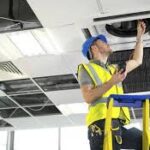Central air conditioning systems are complex networks that combine cooling units, ductwork, drainage systems, and piping to provide efficient comfort throughout a building. While much of the focus is often placed on the HVAC technicians responsible for the cooling components, plumbers also play a critical role in the installation process. Their expertise with piping, water lines, drainage, and connections ensures that the system operates smoothly without leaks or blockages. Without proper plumbing integration, even the most advanced cooling equipment would struggle to perform effectively. Plumbers, therefore, play a direct role in the success and longevity of central air conditioning systems.
Plumbing connections and drainage systems
One of the most significant responsibilities plumbers handle during installation is setting up the drainage system. Central air conditioning units produce condensation as part of the cooling process, and this water must be safely directed away from the system to prevent damage or mold growth. Plumbers install drain lines, traps, and connections that ensure moisture is carried outside or into an appropriate drainage point. They also check that these lines remain free of obstructions, as even minor blockages can cause water to back up into the unit or surrounding areas. This careful planning protects both the equipment and the building’s structure. In many cases, the installation requires collaboration between trades, where plumbing work supports the cooling components, creating a seamless connection between air movement and water management.
Integrating plumbing with cooling components
Plumbers also contribute to the broader integration of plumbing systems with the cooling units themselves. Central air systems often require connections to water lines, particularly when chilled water loops or evaporative cooling processes are used. Plumbers ensure that these connections are secure, leak-free, and adequately sized to handle the system’s demands. Their work helps maintain consistent water flow, which is essential for achieving the desired cooling performance. Additionally, plumbers work closely with HVAC technicians to ensure their installations align, ensuring that pipes, drains, and fittings do not interfere with ductwork or electrical wiring. This collaboration often requires coordination with contractors managing the overall project. Homeowners and businesses that install new cooling systems frequently receive recommendations to consider full-service options that include both plumbing and HVAC services from https://atticmanhvac.com/ the same provider, as this simplifies communication and improves efficiency across all aspects of the job.
Ensuring system efficiency and reliability
The role of plumbers extends beyond simply connecting pipes; they also help ensure that the central air conditioning system operates efficiently. A poorly installed drain line can reduce system performance by allowing water to accumulate, which can lead to corrosion, mold growth, or reduced airflow. Similarly, incorrect pipe sizing can limit water flow and strain the system. Plumbers prevent these problems by carefully evaluating system specifications and ensuring that every connection aligns with manufacturer guidelines and building codes. Their attention to detail safeguards the system from premature breakdowns and unnecessary repair costs. By creating reliable water management pathways, plumbers indirectly improve energy efficiency, as the system does not need to work harder to compensate for hidden leaks or drainage issues. Their contribution plays a key role in ensuring that the system delivers consistent cooling throughout the property.
Supporting long-term maintenance needs
Plumbers also help make future maintenance easier by installing components in a way that allows for accessibility and serviceability. Drain lines, water connections, and plumbing traps are positioned for straightforward inspections and cleaning. This foresight reduces the likelihood of long-term complications, as technicians can quickly address issues without having to dismantle large portions of the system. Some plumbers also provide regular maintenance services, checking drain lines for buildup, ensuring traps remain functional, and verifying that all seals are intact. This ongoing support complements the work of HVAC technicians, creating a comprehensive maintenance approach that keeps central air conditioning systems in good condition for years. The collaborative nature of their work underscores the enduring importance of plumbing, even after installation is complete.
Read More: https://acubi.us/the-role-of-hvac-companies-in-ensuring-proper-ventilation-in-commercial-spaces/
Enhancing safety and compliance
Safety and compliance are other areas where plumbers play a vital role in air conditioning installations. Plumbing codes and building regulations often dictate how drainage systems must be connected and routed to protect public health and property. Plumbers ensure that all installations meet these standards, reducing the risk of code violations and potential fines. They also consider safety in their work by preventing water leaks that could lead to electrical hazards or structural damage. In commercial installations, compliance is even more crucial, as improper drainage or water management can disrupt business operations and result in substantial financial losses. By adhering to codes and prioritizing safety, plumbers not only support the functionality of the air conditioning system but also protect the broader environment in which it operates.
Plumbers play a crucial role in the installation of central air conditioning systems by managing the water lines, drainage systems, and plumbing connections that support overall functionality. Their work ensures that condensation is safely removed, water flows properly, and all components integrate seamlessly with cooling units. Beyond installation, plumbers also contribute to efficiency, safety, and long-term maintenance, reducing the risks of leaks, corrosion, or system breakdowns. Working alongside HVAC technicians and contractors, they provide the plumbing foundation that allows modern air conditioning systems to operate effectively. Without their contribution, these systems would be incomplete, leaving both residential and commercial spaces vulnerable to inefficiencies and potential damage.



